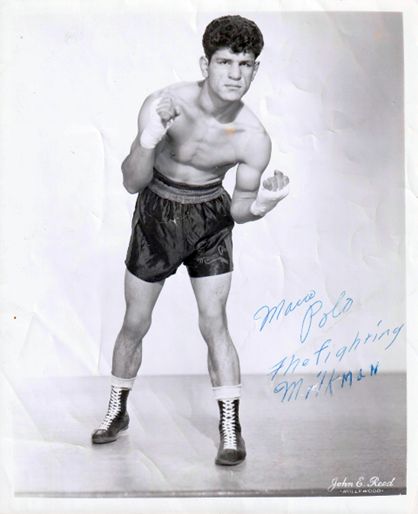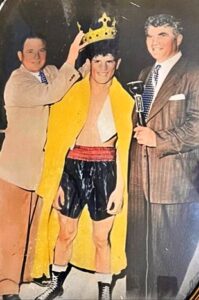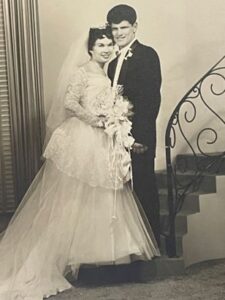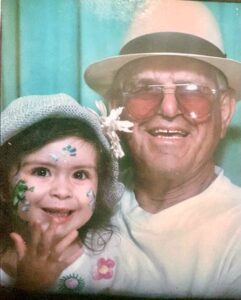THE MILKMAN’S DAUGHTER
An interview with Suzanne Jaurequi-Hughes, daughter of the
“Fighting Milkman” Marco Polo
By: Vincent T. Ciaramella
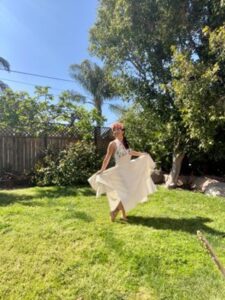 *Suzanne, daughter of Marco Polo the Fighting Milkman.
*Suzanne, daughter of Marco Polo the Fighting Milkman.
She gets her fighting spirit from her dad.
BEYOND THE HEADLINES
If I could get paid to do anything in this world it would be to research boxing history. I love it. It’s my passion and it’s one of the things I excel at. When I start digging into archival material, I get into what psychologist Mihaly Csikszentmihalyi describes as a state of “flow.” However, after I complete my research, I sometimes feel like I didn’t get the entire picture that I was hoping for. Headlines, play-by-play, and editorials can be a great way to learn about the career of a fighter and their craft. However, as a psychology teacher and someone that wants to go beyond the ring, I want to know who they were as a person and how boxing fit into their day-to-day lives. I usually write about late 19th/early 20th century pugilists and finding folks alive today that knew them is a tall order. However, in the last journal issue, I wrote about a mid-century fighter from California named Marco Polo “The Fighting Milkman.” While I feel I got to know him via his boxing career, his personal life remained hidden in the shadows. That is until a friend and fan of the Milkman article, Gregory Joseph Speciale located a digital memorial for Marco, and I was able to contact his daughter, Suzanne Jaurequi-Hughes. What follows is an unabridged interview with her about her father, his career, and who he was when the lights came on and the crowd went home. I also want to thank Francesca, the Milkman’s granddaughter for proof-reading. While I may have written the introduction and questions to this piece, this is Suzanne telling the story of her father in her own words. Included at the end is an updated fight record, filling in the missing gaps from the previous article. So, without further ado,
THE INTERVIEW
*Dad in 1952 after the KHJ-TV Channel 9 King of the Ring match at the Wilmington Bowl.
- Would you please introduce yourself and tell us your relation to Marco Polo?
My name is Suzanne Elizabeth Jaurequi-Hughes. I am the youngest child of four and the only daughter of Marco M. Jaurequi and Elizabeth Louise Viscarra.
- Marco’s pre-fight life isn’t well documented. Documents show that his mother was born in Mexico but there is no mention of his father. Can you fill us in on any information?
Both of my grandparents, Pablo Jaurequi and Justina Jaurequi née Mejia were born in Mexico. They married November 20, 1918, and had their first child in Mexico, my dad’s oldest sibling Jesse. After Jesse was born, my grandfather wanted to take his family and start a life in California. The remaining 10 children were born in Paramount, Los Angeles County, CA. After Jesse there was Paul, Mary, Joe, Doris, Luisa, Frank, Rudy, Johnny, Marcos (my father), and Louie. Growing up in Paramount they lived on a dairy farm owned by my grandfather, and the family would raise heifers for money and sell them at auction.
At the age of 52, my grandfather, Pablo, died of a heart attack. My father, who was 14 years old and in the eighth grade at the time, was forced to quit school to start working and help out the family. He had stated that he missed playing basketball on his school team.
- Do you know how Marco became involved or became interested in boxing?
My Uncle Rudy recently shared with me that my dad went to the gym after working all day in the dairy, and that’s how he was introduced to boxing. He quickly fell in love with it and shared many times how boxing saved him as a young man.
Dad eventually left professional boxing but always coached young men and enjoyed introducing them to the sport. He was hopeful that they would love boxing the same way he did and that it would change their lives for the better. He started his coaching career in Hawaiian Gardens, CA, and later coached in Inland Empire, CA, when he relocated there for the dairy business in 1972. My father was also the head coach at the La Verne Boxing Club under USA Boxing, the official amateur boxing organization. He coached youth boxing there, with one of those young boxers becoming a National Champion in the early ‘90s.
- Why did Marco stop boxing in 1954?
My father stopped boxing in April 1954. Before one of his professional matches, he was evaluated by a doctor who informed him that since his heart was enlarged, it would be possible to die a sudden death if he were punched by enough force to the chest. According to my Uncle Rudy, hearing this news was enough for my father to hang up his boxing gloves. My mother, Elizabeth, had also asked my father to stop his boxing career after hearing the news. After hearing the news and the pleas from my mother, he decided it was time to settle down. They became engaged shortly after and married in April 1955. Dad always carried the two greatest loves of his life, boxing and my mother, with him until the day he died.
* My mother, Elizabeth Louise Viscarra, and father, Marcos Marion Jaurequi on their wedding day. They wed on April 23, 1955, at Our Lady of the Rosary in Paramount, CA.
5. He was known as the “Fighting Milkman” during his fighting years due to his job milking cows. Did he continue to work in the dairy industry after he retired from boxing?
My father milked cows and raised heifers with his brother Rudy in Paramount. He raised 19 heifers and my Uncle Rudy raised 18, which they eventually sold at an auction house located in Cypress. He took the money he earned from the auction to buy a house for my mother.
The “Fighting Milkman” continued milking cows and eventually became the main herdsmen at Bekendam Dairy in Bellflower. He worked there for about 20 years and would follow the dairy to Chino Valley, city of Ontario, in 1972. He retired from the dairy business in the mid ‘80s and started Marco’s Gardening. Dad loved to manicure lawns and make them look just right. He also had many of the dairies as clients
- What was he like at home and can you tell us about his family?
Our father was an excellent provider, and he held a lot of love for his family, especially for his mother. Justina, our grandmother, was wheelchair bound due to complications of her diabetes mellitus. My parents, who were newlyweds at the time moved in with her on our grandparents’ property in order to take care of her. During this time, my oldest brother, Russell, was born in March 1956. My father continued to provide for his mother and his growing family until her death in July 1958. After the death of my grandmother, my parents and Russell relocated to Orange County to the city of Cypress. Shortly after the move my brother, Randall (Randy) was born in June 1960. After Randy it was my brother Ronald (Ronnie) in November 1961, and me in November 1962. Growing up we always had the freshest milk that you could drink, straight from the dairy. He always had room on his knee for me and a hand to hold. Even though my parents divorced when I was seven, my dad always made sure he had time for all of his children. Dad would cheer us on at school events, take us to church on Sundays and get us ice cream after, and come to eat dinner with us sometimes during the week. He was always there when we needed him. My father instilled the importance of education into us from a young age, since he could not finish school. He wanted us kids to have more opportunities through our education. Dad wanted us to know the importance of never giving up and to keep going.
At home, the garage was all his. He had all of his tools, including his shears that he would trim my brother’s hair with. It was also his “at home gym”. Dad also brought home many different animals for us, some exotic in nature. We had animals ranging from road runners to the average chihuahua. Every weekend my brother Ronnie and I would help our dad tend to the church lawn, which we always did for free. Dad affirmed taking care of the church’s lawn was “just something you needed to do.” As we got older, we got to spend time with Dad on the dairy. Those days on the dairy were priceless; I got to solo drive a tractor on the surface streets with my father behind me in another one when I was just 12 years old. Watching my dad bring a calf into the world was one of my favorite memories of working on the dairy. I watched him laugh and live his life while taking it all in.
My dad was also very close to all of his siblings. He would always go over to their homes and spend time with them, bringing us kids with him. Everyone would get together and listen to mariachi music. Dad also enjoyed going to car shows with his brothers, all of the Jaurequi brothers had a love for old cars.
- Did he ever talk about his boxing career with his family?
Mostly everyone in the family knew about my father’s boxing career. His sister, Mary, would listen to his matches on the radio and watch the ones that were televised. Dad talked fondly of his trainer, Jake, who was like a second father to him. We heard many stories of their time spent together inside and out of the ring. He loved to talk about his career with us and how it taught him that there was much more in the world than what was in front of him. We know that Dad was always razor focused during his boxing career, always keeping his eyes firmly on the prize.
- Did he ever teach you or any of your family how to box?
He would show my brothers boxing moves in our garage in Cypress. I would always watch them and want to try, but at that time it was a man’s sport. He sparred with my oldest brother Russell while he was coaching others. He formally trained one of our cousins, Michael, for a span of 10 years off and on. Michael stated that he will never forget the positive influence that our dad gave him. “Nothing is impossible!” dad always relayed to him. Michael also shared this story recently with me:
“They wanted to match Marcos up with the original golden boy, Art Aragon. He couldn’t make the weight. Aragon’s handlers made it impossible for Marcos to fight Aragon. I remember talking to the old matchmakers that Marcos had previously sparred with Aragon and beat the hell out of him. Talking to the older guys that knew him, Marcos was the best fighter out of Clearwater, Paramount. He used to go town to town challenging anybody that wanted to fight him. He was the best, and we were pals.”
- Was there anything in the article published in March that needs to be corrected or expanded upon?
Everything that I have shared thus far should fill the missing pieces of the Fighting Milkman’s story!
- What was it like being the daughter of Marco Polo?
My dad was my dad and my world. His hands of steel that gave those fierce punches to his opponents were the same hands that made me homemade tortillas the shape of elephants, that painted my nails at age four, and would sit in my pink room holding up teacups as we had cookies and Kool-Aid next to my dolls and stuffed animals. As I got older, Dad called me bullheaded which always made me laugh since I got that from him. My father’s strong family-oriented character always made an imprint in my life. He made sure we knew to be proud of ourselves and to keep going. When I held his hand as a little girl until the day he died I felt love and security. I will always walk strong with my head held high as I saw my dad do the same.
11. Finally, is there anything you want to share with the world about your father?
Marcos Jaurequi was a family man. He loved our mother, his children, his grandchildren, siblings, and nieces and nephews fiercely. He was devoted to honoring his mother even long after she had passed, frequently taking flowers to her gravesite. My dad would always show up for family events, no matter the occasion. Everyone enjoyed the company of their favorite “Uncle Marcos,” still to this day reminiscing the good times he had with them.
My father had a strong work ethic and always kept his eyes on the prize. If he fell down, he would get back up stronger. Dad was a devout Catholic his whole life. When we were growing up he was an usher at our church and a member of the Knights of Columbus. He loved attending the Spanish mass services at Saint George’s in Ontario and cherished his nightly prayer time. Virgen de Guadalupe was also very important to him.
Dad was a big fan of the restaurant Norms, taking many people out to eat there whether they wanted to go there or not! My father also was a regular at his local donut shop, driving there nearly every morning ordering a café de olla (cinnamon coffee) and a donut. When you would call him up to check on him he was either watching a Dodgers or Dallas Cowboys game, his two favorite teams. My father was an exceptionally sharp dresser with magnetic charisma. He loved his community, his old cars, cigars, laughed loudly and lived big. Dad loved to dance and listen to his music.
My father lived life his way, a la Frank Sinatra’s “My Way.” He was fearless, often forgetting his limits in his older age. Dad always saw himself as “The King of the Ring” and declared he would “whoop anyone’s ass.” In the final days of his life I asked him if he was afraid or had any regrets and he expressed to me, “Honey when it’s my time God will come get me and I’ll be ready.” Marcos Jaurequi left this world on December 6, 2022. The “Fighting Milkman” was laid to rest at Pierce Brothers Crestlawn in Riverside with his one of his best suits, suspenders, a boxing glove, a cigar, one of his famous hats, a rosary, and with the love for our mother in his heart.
* Marcos with his granddaughter, my daughter, Francesca at the Orange County Fair on July 14, 2002. Fun in the photo booth before seeing Linda Ronstadt & Mariachi Los Camperos.
LIST OF ALL KNOWN AMATURE AND PRO FIGHTS UPDATED
1952: AMATURE
- March 24 Rito Hernandez W/D Wilmington Bowl
- April 14 Gail Jackson W/D Wilmington Bowl
- April 21 Rito Hernandez W/D Wilmington Bowl
- April 29 Bobby Harris W/D Wilmington Bowl
- May 5 Opponent and Outcome Unknown Wilmington Bowl
- May 20 Bobby Harris Draw Wilmington Bowl
- June 16 Rainey Mays Draw Wilmington Bowl
- June 23 Herman LaDay W/D Wilmington Bowl
- July 14 Walter Kinolio TKO Wilmington Bowl
- July 16 Luie Alaniz W/D South Gate Arena
- July 23 Rainey Mays L/D South Gate Arena
- July 30 Rainey Mays Draw South Gate Arena
- Aug 6 Frankie Romero W/D South Gate Arena
- Aug 13 Davey Lopez Outcome Unknown South Gate Arena
- Aug 27 Gerald Zapata Draw South Gate Arena
- Sept 8 Rainey Mayes Draw Wilmington Bowl
- Sept 10 Frankie Romero W/D South Gate Arena
- Dec 1 Alex Diaz Outcome Unknown Wilmington Bowl
- Dec 29 Felix Franklin Outcome Unknown Wilmington Bowl
1953: AMATURE
- Jan 12 Ken Brennan W/KO Wilmington Bowl
- Jan 19 Ed McGowan W/KO Wilmington Bowl
- Feb 4 Herschal Acton W/D Legion Stadium
- Feb 6 Rainey Mayes L/D Legion Stadium
- Feb 16 Jimmy “Duke” Dyer W/TKO Wilmington Bowl
- Mar 2 “Sailor” Jim Dupree W/? Wilmington Bowl
- Mar 10 Romeo Silva W/TKO Wilmington Bowl
- Mar 16 Sonny Varner W/D Wilmington Bowl
- Mar 23 Ed McGowan W/D Wilmington Bowl*
* Wins King of the Ring and receives title, robe, crown, and a 1 weeks all expenses paid trip to New York City
1953: PROFESSIONAL
- June 29 Johnny Martin W-PTS South Gate Arena
- July 18 Johnny Martin W-TD Legion Stadium, Hollywood
- Sept 12 Bob McLane L-SD Legion Stadium, Hollywood
- Oct 10 Joe Cardenas L-PTS Legion Stadium, Hollywood
- Oct 17 Joe Cardenas W-KO Legion Stadium, Hollywood
- Nov 7 Frankie Haynes W-PTS Legion Stadium, Hollywood
- Dec 5 Joe Cardenas W-KO Legion Stadium, Hollywood
1954: PROFESSIONAL
- Jan 2 Carlos Camacho L-SD Legion Stadium, Hollywood
- April 3 Bob McLane L-PTS Legion Stadium, Hollywood
1954: CHARITY EVENT
- March 24 Joe Cardenas L-D Las Vegas, Nevada
